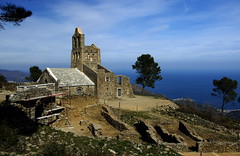
My small hometown–Murrysville, PA–is undergoing a time of shock and pain because of the Alex Hribal’s attack. Two steak knives and a blood bath. Many heroes were made, but the event was and is traumatic–rocking the community to its core.
My young niece (the daughter of my brother’s who is a Franklin Regional Alumnus from the 1990s) was not allowed to attend her classes at the elementary building at Franklin Regional and her street shut down as FBI, State Police, and legions of first responders, media, and others have swarmed the scene.
My family’s church, the church were I was married, mourns as an entire community and feels trauma and pain deeply because several from their youth group teen were wounded. Some of them have undergone surgery.
All are expected to survive. Praise be to God for that grace.
It would be easy to say this youth of 16 years old is a monster, but students attest that he was very nice. Answers for why it all happened are left unanswered at this time.
In these times, the community of faith raises its voice in communal lament. We are comforted by each other and by a good God who is with us in our pain.
Sadly, violence has become a normal occurrence in school settings… and it may be your hometown that suffers next. But, parish the thought!
If not that, than surely you and your community will encounter pain and loss.
For that, here are some thoughts on Communal Lament.
1. About 1/3 of the Psalms are songs of lament. They are meant to be sung as prayers. They can be read with that in mind.
2. God invites us to cry out in our pain, not to suppress it, or put on a “happy face”. That kind of honesty dignifies our feelings and helps us feel our emotions fully, so we can move toward healing.
3. Communal laments are always meant to be expressed in the context of ongoing faith and trust in God.
4. Our laments (communal and individual) are a normal response to the pain and loss of life and living; they help us experience greater bonds of community and healing from God.
5. Laments of the psalms are unvarnished. That is an important quality to understand. They depict the anguish, desperation, pain, and messy feelings that often smack of ill-intension toward enemies and abusers, in parts. They may seem to condone retaliatory violence. But, that’s not the end of the story (song)…
6. If the reader or hearer pays close attention, she or he will notice each song ends in hope and trust in the Lord. This is key to the communal lament. All is left in God’s hands.
(In this way, our burdens lift and our faith grows.)
7. Communal laments are a cry from a whole group for Justice (things to be put to rights) and this ultimately necessitates the elements of…
• Mercy
• Forgiveness
• Reconciliation
• Restoration
• Redemption
Here is a resource on the types and categories of Psalms. May they be of comfort to you.
Join with your community and raise your voices in lament when your hearts are heavy with sadness, pain, and grief.
For your reflection:
Psalm 63
A psalm of David, regarding a time when David was in the wilderness of Judah.
1 O God, you are my God;
I earnestly search for you.
My soul thirsts for you;
my whole body longs for you
in this parched and weary land
where there is no water.
2 I have seen you in your sanctuary
and gazed upon your power and glory.
3 Your unfailing love is better than life itself;
how I praise you!
4 I will praise you as long as I live,
lifting up my hands to you in prayer.
5 You satisfy me more than the richest feast.
I will praise you with songs of joy.
6 I lie awake thinking of you,
meditating on you through the night.
7 Because you are my helper,
I sing for joy in the shadow of your wings.
8 I cling to you;
your strong right hand holds me securely.
9 But those plotting to destroy me will come to ruin.
They will go down into the depths of the earth.
10 They will die by the sword
and become the food of jackals.
11 But the king will rejoice in God.
All who trust in him will praise him,
while liars will be silenced.

 I’m very glad to have the honor of being the guest writer today at Thomas Turner’s blog:
I’m very glad to have the honor of being the guest writer today at Thomas Turner’s blog:


